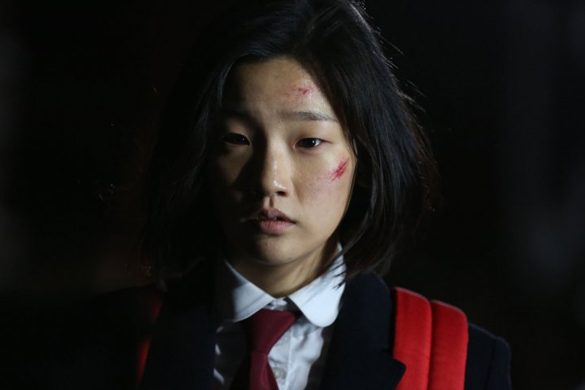"Humans are creatures of duality.
We all celebrate the birth of Jesus at Christmas,
but when things like this happen, we bring up logic and reason."
Synopsis:
Catholic schoolgirl Young-shin (Park So-dam) tries to commit suicide by throwing herself out of a hospital window after being the victim of a hit and run car accident. Fearing that her attempt to end her own life may be a (further) sign of demonic possession, maverick priest Father Kim (Kim Yoon-seok) sets out to assess the shocking situation, fully prepared to perform a deeply dangerous exorcism, if necessary.
Church leaders call in Deacon Choi (Kang Dong-won) to serve as Father Kim’s assistant, the young deacon also being tasked with filming proceedings to ascertain if Young-shin's problems are perhaps that she is being sexually abused by Kim.
As the two ‘dark priests’ – the literal translation of the film’s Korean title – begin their perilous journey to battle a demonic spirit for Young-shin’s eternal soul, they are, however, unaware that the Church is far from innocent in the young girl’s desperate plight...
Review:
‘The Priests’ begins with two Italian priests discussing, in hushed tones, 12 malevolent spirits responsible for suffering and tragedies around the world and the fact that one has supposedly shown itself (so to speak) in Korea. Unable to contact the Korean priest of the time who dealt with exorcisms, they set out to stop the demon themselves and in doing so set off a chain of events that directly result in Young-shin’s terrible predicament, though we are not aware of that fact until somewhat later in proceedings when we see a specific scene replayed in flashback from a somewhat different camera angle. Korean films, on a fairly regular basis, could be said to start at a noticeably slow pace – building increasingly as the narrative progresses – but that certainly isn’t the case in ‘The Priests’. Within just three minutes of the running time, the aforementioned hit and run accident has taken place, followed just seconds later by two high octane car crashes involving the same automobile.
As such, viewers have a sufficient adrenaline rush very early on to allow the film to take a breath after a highly evocative credit sequence – complete with organ music, religious chanting and visuals of (seemingly) medieval paintings and drawings of demons, devils and tormented victims – to spend a sufficient amount of time to introduce the main characters and background story.
Of course, the success of such a course of action is wholly dependent on a director’s ability to balance pacing as the story progresses and not make it feel that the film has simply yelled ‘Bang’ for the sake of it too quickly. Thankfully, director Jang Jae-hyun manages to balance all of the above with aplomb, perfectly peppering quieter segments with flashbacks, dreams/imaginings of fast paced moments - many as beautifully horrific as such a story requires - in spite of this being director Jang’s first full length feature.
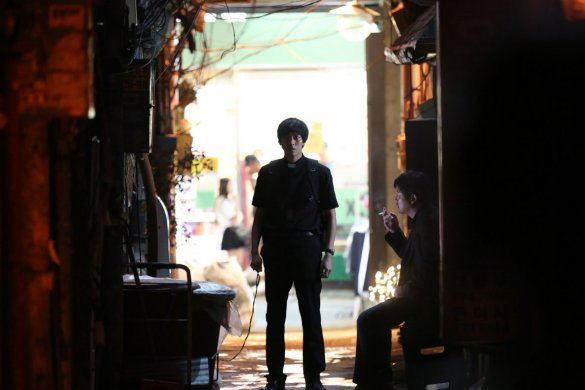 |
Another strength of ‘The Priests’ is the fact that though the narrative is centred on Catholicism, the modern day continuing importance and indeed use of traditional Korean religious ideas, rites and rituals is firmly stated and shown. Father Kim is on friendly terms with a number of Shamans (a traditional shamanistic exorcism is also shown in detail within the story); Kim chooses 15 July as the day to perform Young-shin’s exorcism as it heralds the Buddhist ‘Festival of the Hungry Ghost’, when yin is at its strongest; and of course the use of a pig as a temporary vessel to hold an exorcised spirit.
As such, ‘The Priests’ not only manages to fit with the exorcism horror genre expected by most viewers but also at the same time stands as far more original than most, being both modern and traditional in its religious dissections, but wholly Korean in both.
Jang Jae-hyun uses settings, lighting and framing to further accent this battle between good and evil, light and darkness. Rarely in recent memory have I seen scenes with Seoul looking so beautifully bright – even gleaming – juxtaposed with darker, shadowy areas in which our dark priests are situated. On numerous occasions, Deacon Choi especially is shown in a dark alley on the very edge of the neon-lit metropolis and the more involved he becomes in helping Father Kim, the more noticeably separated from that brightness he seems. And as we follow Choi and Father Kim farther and farther from the light of normality, we are led straight to the darkness holdoing Young-shin in its twisted grasp.
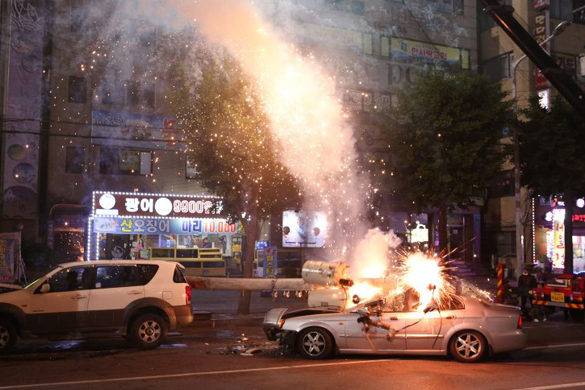 |
Those who have had the opportunity to see both ‘The Priests’ and Jang Jae-hyun’s 2014 short film ‘12th Assistant Deacon’ will already have come to the realisation that the latter is based on the former, ‘The Priests’ being a feature-length extension and expansion of the same story.
While ‘12th Assistant Deacon’ is just 29 minutes in duration, it wholly feels like a complete tale which may make some wonder if the lengthier narrative of ‘The Priests’ consists of padding, at least to an extent. However, that idea couldn’t be further from the truth. Rather, director Kang Jae-hyun deftly uses the extra time available in ‘The Priests’ to flesh out plot elements more fully in a consistently well-paced and indeed gripping manner as well as including extra story elements that underline both the modern religious themes present and the traditional Korean shamanism aspects, thereby allowing the film to appear specifically, originally Korean and in the process step above the majority of (some might say overused) narrative tales from around the world dealing with demonic possession and exorcism.
Case in point: The use of a pig in ‘The Priests’ as a temporary vessel for an exorcised, evil spirit. As well as screaming of traditional Korean shamanistic rites and rituals, its appearance allows for the setting up of more than one humorous moment (Deacon Choi, for example, taking the animal on a leash to a restaurant specialising in pork dishes, where Father Kim barbecues pork belly meat as the pig watches, staring upwards), providing a gentle respite from the enticing darkness inherent to a story such as this or (if you prefer) perfectly lulling viewers into a false sense of security prior to the utterly gripping exorcism itself.
This style of gentle humour plays an important and repeated part of the narrative as ‘The Priests’ unfolds. Much of this involves Deacon Choi individually (audio stating the qualities required in an exorcism assistant while visuals show Choi in completely the opposite light, for example) and the almost argumentative banter of his interactions with Father Kim. However (again in flashback), we also witness, for example, a sweetly funny moment featuring Young-shin in which Father Kim listens to her abysmal singing as she tries to become a choir member, the young girl protesting vehemently that she’s ‘really good’ when Father Kim drags her away telling her choir singing is probably not for her.
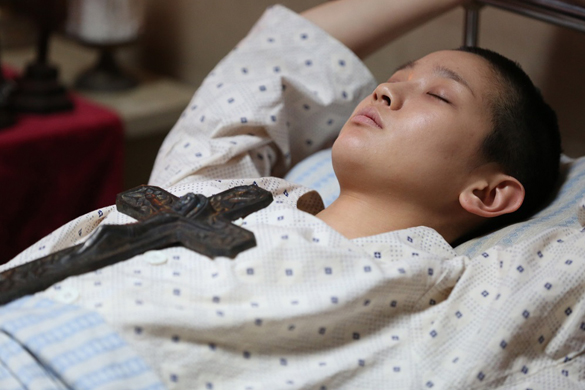 |
And before we leave the subject of comparisons completely, while the acting in ‘12th Assistant Deacon’ certainly doesn’t warrant any particular criticism, it almost goes without saying that it pretty much plays second fiddle to the exemplary performances present in ‘The Priests’ – and I realise that such a comment is fait accompli considering the sheer calibre of the feature’s top notch cast. Kim Yoon-seok and Kang Dong-won have a noticeable chemistry and play off each other perfectly, Kim Yoon-seok, especially, clearly relishing playing the role of a bitter, twisted renegade priest fighting for the very soul of an innocent.
However, great though their acting is throughout ‘The Priests’, they cannot hold a candle to Park So-dam’s utterly astonishing performance as troubled schoolgirl Young-shin. Park So-dam has been making quite a name for herself as an exemplary actress since her emergence in the Korean film industry in 2013. The first I became specifically aware of her was in 2014 with her small, supporting role in ‘Scarlet Innocence’ (a film that is still my favourite by far from that year), followed by her larger role in 2015’s ‘The Silenced’. Since then she has played parts in massive blockbuster hits ‘Veteran’ (Ryoo Seung-wan) and Lee Joon-ik’s ‘The Throne’, but it is her performance as Young-shin in ‘The Priests’ that I almost guarantee will secure her place as an acting talent to pay real attention to.
Many years ago, when I reviewed ‘My Sassy Girl’, I said that Jeon Ji-hyun was meant (even perhaps destined) to play the part of the main female character and I feel exactly the same about Park So-dam in ‘The Priests’. Though she appears only fleetingly until the actual exorcism gets underway, once it does she utterly owns the screen, seamlessly switching from frightened, innocent victim to evil personified in the blink of an eye. And as for her jaw dropping performance as evil incarnate? Well, while I can easily say you’ll almost believe that you really are looking a demon in the eye, no comment I could ever make will do such an incredible performance the justice it truly deserves.
There are many reasons ‘The Priests’ is worth watching and almost as many that make it deserving of being considered more than just another exorcism horror movie but even if there weren’t, Park So-dam’s acting alone would be reason enough, to the nth degree.
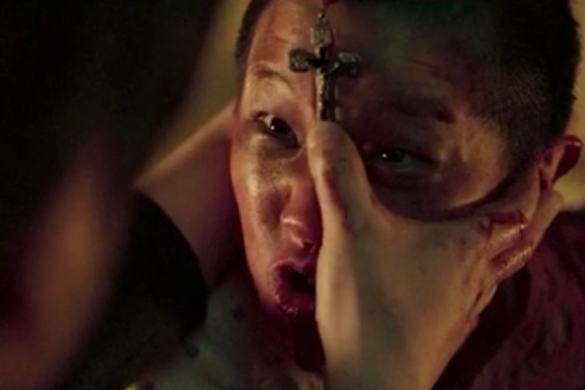 |
Summary:
While many would consider one exorcism horror movie to be much like another, ‘The Priests’ manages to combine ideas of modern Catholicism with far more traditional Buddhist rituals to bring an originality to proceedings. Not only that, but this deftly paced, engaging horror narrative is raised yet further by exemplary performances from a top notch cast, especially in the case of actress Park So-dam who is frankly an absolute revelation in her role.
‘The Priests’ (검은사제들) / 2015 / directed by Jang Jae-hyun
‘12th Assistant Deacon’ (12번째보조사제) / 2014 / directed by Jang Jae-hyun
|


